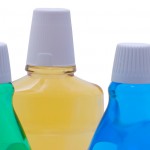
Maintaining good oral hygiene can be difficult while undergoing fixed appliance orthodontic treatment particularly in children and adolescents. In addition, changes to the oral microbiota may increase the number of potentially pathogenic gram-negative bacteria. Mouthwashes can be a useful adjunct to toothbrushing, and three broad groups are available, fluoride compounds anti-microbial agents, or plant extracts. The efficacy of a number of anti-gingivitis and anti-microbial mouthwashes have been tested in patients undergoing orthodontic treatment.
The aim of this review was to evaluate the efficacy of mouthwashes on oral microorganisms and gingivitis in orthodontic patients.
Methods
A protocol for the review was registered in the PROSPERO database. Searches were conducted in the PubMed, Embase, and Cochrane Central Register of Controlled Trials (CENTRAL), ClinicalTrials.gov and the International Clinical Trials Registry Platform (ICTRP), Conference Proceedings Citation Index-Science (CPCI- S), the ProQuest Dissertations and Theses (PQDT) and GreyNet databases. Randomised controlled trials (RCTs) in orthodontic patients published in English or Chinese comparing adjunctive use of mouthwashes to placebo or blank controls that included as outcomes at least one microbial parameter and/or plaque- and/or gingival inflammation-related indices were considered. Two reviewers independently selected studies extracted data and assessed risk of bias with the Cochrane tool for RCTs (RoB2). Outcomes were pooled as weighted mean differences (WMDs) and 95% confidence intervals (95%CIs). The GRADE approach was unused to assess the certainty of evidence.
Results
- 32 RCTs were included in the review with 9 RCTs contributing to the meta-analysis.
- Most studies were conducted in adolescents and young adults.
- Follow-up periods for most studies ranged from 4 days to 3 months, with those involving fluoride being 6 months or longer.
- Only one studies was considered to be at low risk of bias, 14 at high risk and the remainder having some concerns.
- Meta-analysis of microbial outcomes was not possible because of a lack of study uniformity however a number of mouthwashes demonstrated short-term effects on bacterial colony counts including Mutans streptococci (MS).
- A majority of the studies affirmed that chlorhexidine (CHX) mouthwashes reduced plaque- and gingival inflammation-related indexes compared to placebos or blank controls. CHX studies reported side effects including staining, unpleasant flavour, burning sensation on the mucosa, taste alteration and dry mouth.
- Most studies indicated that herbal mouthwashes were effective in reducing plaque- and gingival inflammation-related indexes compared to placebos. Reported side effects were lower than for CHX but included unpleasant flavour, taste alteration, tooth stain, burning sensation, and dry mouth.
- Some short-term fluoride mouthwash studies showed beneficial effects on gingival and plaque indices but insignificant changes in longer term studies.
- A small number of studies indicated beneficial effects with probiotic mouthwash and chlorine dioxide mouthwash.
- Meta-analyses showed significantly lower gingival index scores for CHX compered to placebo and blank controls as well as for herbal mouthwashes verses blank controls. Significantly lower plaque index scores were also seen for CHX versus blank controls (see table below).
| No. of studies (participants) | Weighted Mean Difference (95%CI) | |
| Gingival index | ||
| CHX v placebo | 3 (98) | -0.45 (-0.70 to -0.20) |
| CHX v blank controls | 6 (274) | -0.54 (-0.96 to -0.13) |
| Herbal mouthwashes v blank controls | 3 (132) | -0.20 (-0.32 to -0.09) |
| Plaque index | ||
| CHX v blank controls | 4 (188) | -0.70 (-1.12 to -0.27 |
- The certainty of evidence for all outcomes was rated as very low to low with the exception of outcome of gingival index in mouthwashes verses blank controls which was rated as moderate.
Conclusions
The authors concluded: –
The short-term application of fluoride mouthwashes may reduce the colony counts of cariogenic bacteria, but the long-term effect is not evident. Chlorhexidine may reduce the colony counts of multiple microorganisms in the short-term. Short-term application Chlorhexidine and herbal mouthwashes may effectively reduce plaque- and gingival inflammation-related indexes. However, the risk of bias, inconsistency, and imprecision in the included studies may reduce the certainty of the evidence.
Comments
The authors preregistered a protocol for they review and undertook an extensive search for relevant studies. While 32 RCTs were included only one was assessed as being at low risk of bias. The included studies were generally small with sample sizes ranging from 25 to 270 with only 12 RCTs involving more than 50 patients.
The findings suggest an impact of mouthwashes on Mutans streptococci in the short-term but heterogeneity of the studies meant that a meta-analyses could not be undertaken. A 2017 Cochrane review (Dental Elf – 3rd April 2017) provided high quality evidence that the adjunctive use of mouthwashes containing chlorhexidine for 4 to 6 weeks or 6 months leads to a large reduction in the build-up of plaque. However, patients undergoing orthodontic treatment were excluded. This review focussed on those undergoing orthodontic treatment looking at impact on oral microbiota and gingivitis although 12 of the 32 included studies had a duration of shorted than 4 weeks so may not have demonstrated an effect on plaque levels. The reviews findings do however indicate a positive effect for CHX mouthwashes on plaque and gingivitis levels as well as for other mouthwashes although a majority of the evidence is of very low to low certainty.
Links
Primary Paper
Ren X, Zhang Y, Xiang Y, Hu T, Cheng R, Cai H. The efficacy of mouthwashes on oral microorganisms and gingivitis in patients undergoing orthodontic treatment: a systematic review and meta-analysis. BMC Oral Health. 2023 Apr 6;23(1):204. doi: 10.1186/s12903-023-02920-4. PMID: 37024817; PMCID: PMC10077628.
Other references
Dental Elf – 3rd April 2017
Dental Elf – 27th Nov 2019
White spot lesions: Topical fluoride for prevention during fixed orthodontic treatment
Dental Elf – 2nd Dec 2020
Powered toothbrushes and plaque control in orthodontic patients
Dental Elf – 10th Mar 202
